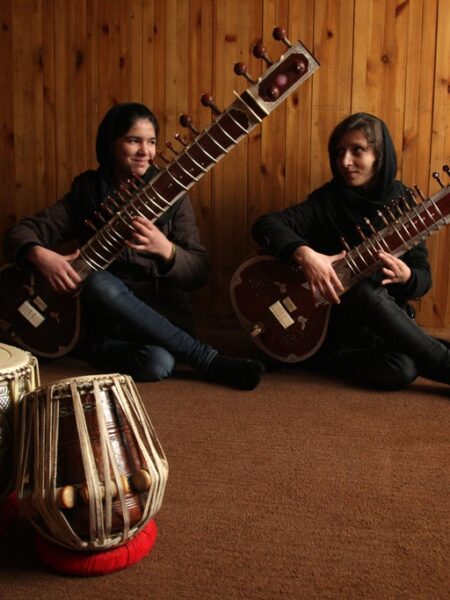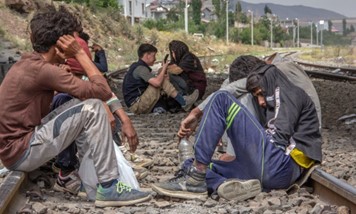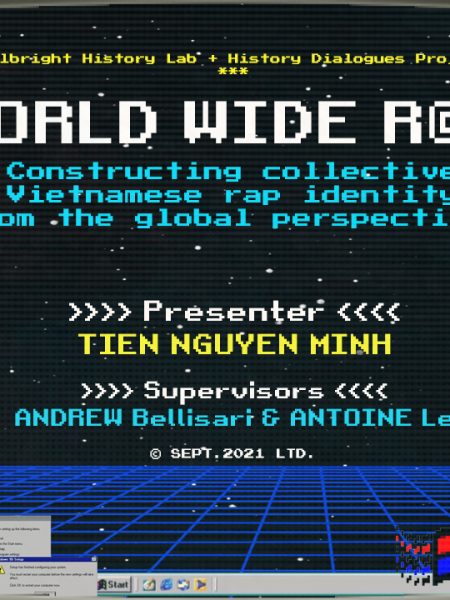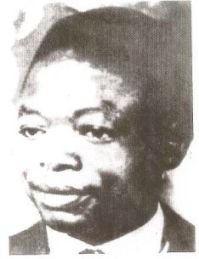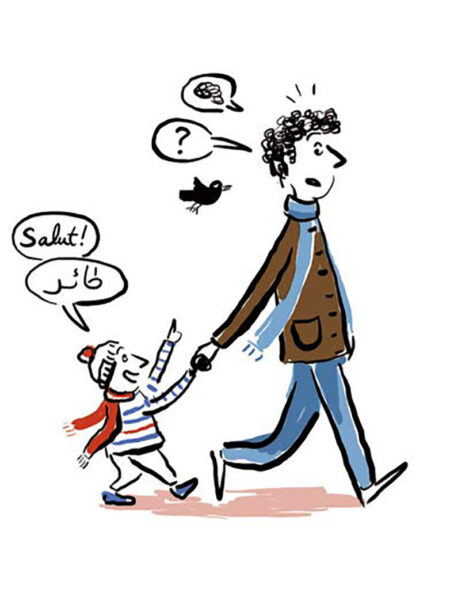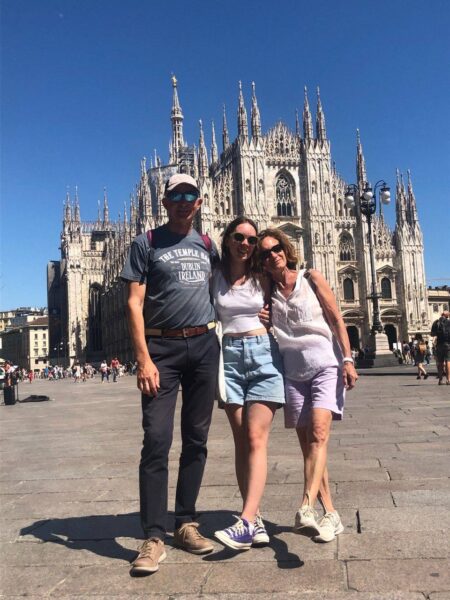MIGRANTS AND FRENCH LANGUAGE
A research led by Pauline HAIES (Sciences Po Paris) for Princeton University’s GHL
In his Introduction to psychoanalysis (1916 – 1917), Freud states : “With words, someone can make his fellow happy or drive him to distress, and it is thanks to words that teachers deliver their knowledge to students, that speakers encourage listeners to follow them and shape their judgments and decisions” [1]. Accordingly, far from being only a way to bond people together in a society, language shapes power relationships. For migrants from across the globe coming to France, learning French is not only a matter of inclusion but also of acknowledgment to be part of that competition for recognition. Consequently, migrants face several issues when arriving in France that I describe in that article, asking ourselves : how is language considered as an essential but not sufficient part of a migrant’s integration into French society ? If migrants have to go into that “linguistic market”, as Bourdieu calls it in Language and Symbolic Power [2], fighting thereby a solidified victim identity, they also need art so as to get out of that language’s standardization and be truly themselves, again.
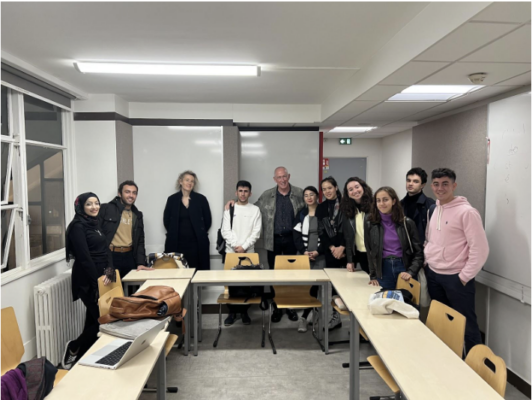
Language defines social place, value and legitimacy
A. Language is power
As a French teacher in Jesuit Refugee Service (JRS), a migrants’ welcoming association which combats social exclusion [3], I taught a group of 15 adult migrants this year on Mondays. I have face the pressure they feel to learn that language efficiently so that they can get a job, undertake admin procedures, and integrate more easily. Nevertheless, I often felt that pressure was not only a formal and tangible one : part of it came from a need to be recognized as a person who has made efforts to be legitimized in the French people’s eyes to live and stay in France. So, a social part was added to the linguistic and administrative one. Masood Mohammadi, one of my students whom I interviewed, explained that in French : “Several times in the news do I hear that ‘foreigners are dangerous’, so I feel the need to make efforts in order to show that I am not” [4]. And when I asked how he conveyed that idea to people, he noticed that they react differently when hearing his accent, forcing him to say “I am not different, even if my past obviously has an impact on my beliefs”[5]. As a consequence, just like Masood, migrants feel the need to fight prejudices, like the danger one.
Does it mean that French society, at first, is a contempt one, working as Axel Honneth describes in his book La société du mépris [Society of scorn] [6] ? In the introduction of his book, Olivier Voirol reminds the fact that according to Habermas, who is a serious influence to Honneth’s theory, “social people’s action cannot be guided exclusively towards domination purpose […] because it also chases mutual understanding’s end, thanks to language” [7]. By doing so, citizens shape their own social’s horizon. However, in that conception, migrants not fluent in French are excluded from that discussion, even though their aim is to integrate. That gap is even more noticeable when we consider Habermas’ opposition between the “lived world”[8] and the “system”[8]. In The Theory of Communicative Action [9], as explained by Olivier Voirol, Habermas underlines that communication, until then untouched, is contaminated by systemic forms of regulation, leading to a social “pathology”[8], named by Axel Honneth after him, “social pathologies” [10]. As described by Olivier Voirol, “lived world colonization by power and economical system threatens social sphere, which base is understanding using communication” [8].
Actually, as shown by Bourdieu in his famous Language and Symbolic Power, language, far from being an only intellectual, is also a power and action tool, as it is, in fact, “the product of a complex set of social, historical and political conditions of formation” [11]. Accordingly, Bourdieu highlights that “every linguistic interaction, however personal and insignificant it may seem, bears the traces of the social structure that it both expresses and helps to reproduce” [12], as “actual speakers”[13] competence is “a capacity to produce expressions which are appropriate for particular situations, that is, a capacity to produce expressions à propos”[13]. Camille Michel, a theater student at ENS Paris who led theater workshops destined to migrants, emphasizes that point : “If you cannot express yourself in a society, you cannot defend yourself, and even exist. In order to exist in society, migrants have to acquire language, but their recognition includes the acceptance of different expressions. But in France we have a hierarchical culture on this, as there really is a legitimated expression which is an academic or artistic one, and I think it is a problem that we do not take into account other means of communication such as those of the migrants’” [14].
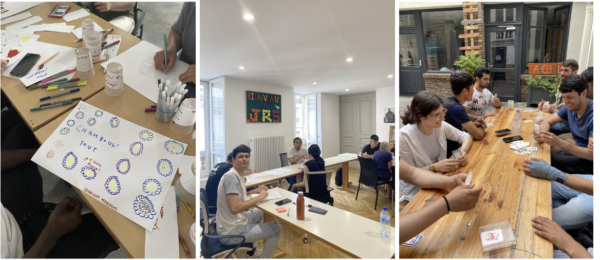
B. Language can lead to discriminations
Hierarchical culture concerning language can also be seen through a concept theorized by Philippe Blanchet and called “glottophobia” in Discriminations : combattre la glottophobie [Discriminations : fighting glottophobia] [15], which is a form of discrimination based upon language judgment. The prohibition of linguistic discrimination in the French Code pénal since 2016 places French law against the assimilationist theory which forces migrants to express themselves only in French. Multiple migrants whom I interviewed showed that, despite the interdiction in the Code pénal to “distinguish someone according to […] their capacity to express themselves in another language than French” [16], they suffered from less recognition because of their origin and their expression, especially in administrative situations.
Masood Mohammadi declared that sometimes, when he doesn’t use the accurate words, the reaction is not benevolent : “For example in the administrative context, it happens that you say something, or use certain professional words, you say “I didn’t understand”, and they are surprised, they look at you strangely: “why didn’t you understand?” [17]. Moreover, when I asked him if he was angry that no efforts were really made to understand him sometimes, he answered :
“Yes, too much. […] I believe that we live in a society where many foreigners live, you have to try to understand another person, despite the fact that they do not speak French, English poorly or another language poorly.” [18] He also gave me a meaningful example : “I remember for example, once I called the administrative work, and I waited, I don’t know, 20 minutes, 40 minutes, for someone to answer the phone. Because I needed an administrative work certificate and I had to do this to settle some things. I had to call and after, 20 minutes, 30 minutes, someone answered the phone: ‘Yes, hello Sir’, and I tried to explain, ‘Hello, I’m calling you because I need this, my number is that, etc’, and they told me ‘I didn’t understand’, I tell her again, but I feel that they have not tried to understand me. And I feel discouraged, and that’s it. Because when I needed to find a solution, I called back in the afternoon, and in the afternoon, a gentleman answered the phone. That is to say in the same administration. And the gentleman listened to me, responded and settled the thing” [19].
Anna Okunevych, another student, noticed that in order to integrate “we have to ride a bike with more intensity” [20], including because “administration is the worst here”[21]. She highlighted the great deal of time to get administrative rights, more than French people, as Masood remarked with astonishment. For both of them, speaking French fluently means having the occasion to be considered equally by French people in social, professional, or administrative contexts.
In The struggle for recognition [La lutte pour la reconnaissance] [22], Axel Honneth states that “the possibility of an harmonious relationship with oneself depends on three forms of recognition (love, law, social esteem)”[23], and then tries to demonstrate that these three types of recognition correspond to three ways of scorn which can play a role in the beginning of social conflicts [24]. In the same way, Bourdieu showed that a value is attributed to a communication act, creating an exchange market by which socially characterized people recognize the social competency of the others, according to the similarity between the speech’s style and legitimate language’s standards. The less value in comparison to the official language the linguistic products have, the less social competency the speaker has. [25] That is felt by Masood : “It means that I too belong in society, like anyone else” [26]. That is why having control of the legitimated French language is a real issue for migrants, especially in standardized contexts such as the Ofpra one, when migrants have to tell their story in order to be granted, or not, their right to asylum. Camille questioned the ethics of evaluating that right with the tool of language, considering that, as Masood underlined, translation is often wrong, given the cultural gap between Afghanistan and France, for his case : “It was especially when I spoke of feelings and culture that she was not able to translate. […] For example, when I explained why I left Afghanistan. It was difficult because there are things that are allowed in France but punished in Afghanistan, such as homosexuality, even if it is not part of my history, it was an example and you can be killed because of that”[27]. Consequently, as a teacher preparing students for the Diploma in French Language Studies (DELF), I had to not only teach them the academic language but also always explain grammar rules in real life context, sharing our multiple perceptions of life and promoting interculturality, challenging as a matter of fact the standardization of language and of parts of life. That is what Camille regrets in administration : “I think that when we reuse everything they have experienced to put it in an extremely administrative form it can be quite painful and that’s where the theater can also intervene to reuse these stories and share it in an artistic way”[28]. So, art is complementary to language insofar as it enables migrants to exist by other means, such as body language.
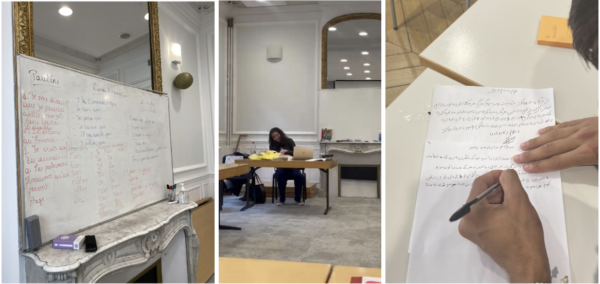
Art as a shield against language’s standardization
A. Art helps opening oneself to another story thanks to sensibility
In this respect, art is obviously a shield against the durability of a dominated identity defined in language relations. As Camille highlighted, theater “helps making people who are less open to immigration understand the respect we should have towards people who left their country because if they got there it’s because they have an incredible life force but also it makes people aware of the difficulties” [29]. She wrote a play named The memory of your ashes, where music and dance were also a way to tell Wael’s story, who fled Syria for France. According to her, art is complementary to social sciences insofar as it enables us to fight against prejudice thanks to identification and sensitivity. She took the deviance example quoted by Masood a few days before : “Well often the police and media point out migrants who go into crime but, in fact, when you understand all the difficulties there are when you arrive in a country, you better understand why they are encouraged to turn to paths of deviance and so on. So it allows you to feel that a little and it’s different than doing it through a sociological analysis which will deconstruct a little, for example, all the stages of a migration journey since in fact people will understand it but they will not necessarily remember it already and it will not necessarily affect them whereas art really allows you to touch people’s sensibilities”[30].
As a consequence, “art can represent a sensitive part that is not necessarily visible in reality” [31] and can, in this respect, play a role in the need for recognition, restituting the personal story in a non-spectacular way : “in fact we have to tell what’s worse and so on. I think that’s a bit traumatizing to always have to say that”[32]. She regrets not having highlighted enough common parts of his student life in Paris so as to tell more about his story from Syria. Consequently, theater enables people to “open their mind”[33] and “meet them as a person”[34], hence the necessary democratization of culture, a track the French Comédie Française seems to follow, with multiple academic partnerships.
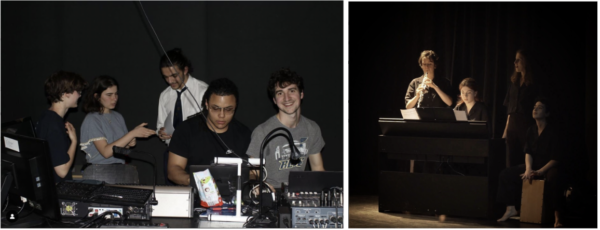
B. Art enables migrants to create their identity
Therefore, art provides a new social identity to migrants in the eyes of spectators. Moreover, it allows them to believe in their new identity, creating an intercultural society. Chloé Chycki, a theater professor at JRS, highlighted the liberation of oneself allowed during theater courses. Migrants do not need to be fluent in French, as they can speak in a theater language with no meaning except the one given by the intonation : “the gromelot”[35]. That idea is also developed by Camille, who also teaches theater to migrants in Odéon in Paris : “it allows them to deploy a word that is precisely other than that of self-presentation”[36], that they have to employ in the administration such as the Ofpra, which is the initial situation of her play. Art and especially theater, gets around the power relationships imposed by language by reshaping them : “By doing theater I think you learn to replay different social roles” [37]. As a consequence, art lets one find their own identity thanks to a new relationship with others, not constrained by the “linguistic market” as Bourdieu calls it [38]. Also, poetry is a resource for migrants to express themselves : Mohammed, which I met at JRS, writes poetry to “leave his mark wherever he goes”[39] with the Colline theater : “I write on my phone, for example, there I wrote about the fact that nothing is constant in life. Also on the fact that we come from a specific place on the planet and we move” [40]. So, poetry enables him to deal with his constant change of identity : “It allows me to keep track because there is no constant in life, everything changes over time. It is important. For example with the moon, yesterday it was not in the same place. The moon also has to adapt over time. Like us, like the sun”. [41] And then, he explained that he has “to always do something to keep the source alive, to assure continuity”[42], and that he “is in a competition to leave his marks in life”[43]. Consequently, competition seems never really over, even in liberation contexts such as art ones. Nevertheless, despite that pressure, Mohammed writes poetry to understand who he is in a world that always changes : “Also it is good to know where I am from, who I have to become” [44].
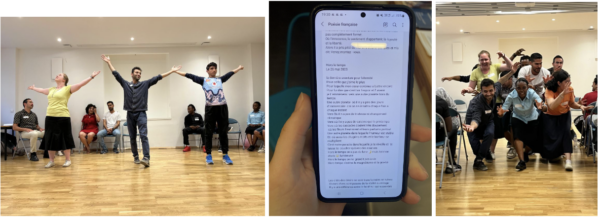
Conclusion
Language is therefore essential but not sufficient for a successful integration into society as a migrant. Containing a real social value determining one’s position and legitimacy to express oneself, French language and its learning are an issue exceeding the understanding of French vocabulary and syntax. That is why art is a way to overcome that standardized context in which migrants tend to have a set identity : thanks to theater or poetry to cite but two examples, they feel the right to reinvent themselves and integrate with more authenticity.
Footnotes
[1] Freud Sigmund and S. Jankelevitch. 1982. Introduction a La Psychanalyse. (Paris: Payot), 11.
“Avec des mots un homme peut rendre son semblable heureux ou le pousser au désespoir, et c’est à l’aide de mots que le maître transmet son savoir aux élèves, qu’un orateur entraîne ses auditeurs et détermine leurs jugements et décisions”.
[2] Bourdieu Pierre Matthew Adamson Gino Raymond and John B Thompson. 2018. Language and Symbolic Power. Cambridge; Malden (Ma): Polity Press.
[3] https://www.jrsfrance.org/
[4] “dans la société j’entends plusieurs fois dans la réseau dans la télé dans la média qui dit « étrangers sont dangereux » jusqu’à je montre et voilà je suis pas dangereux, je fais des efforts pour montrer que je suis comme vous”
[5] “voilà je suis comme vous peut-être que je suis un peu différent donc parler avec un accent mais il n’y a pas différent et c’est que j’ai vécu bien sûr ça impacte sur mon comportement sur mon croire, croire ?”
[6] Honneth, Axel. La société du mépris : vers une nouvelle théorie critique. (Paris: la Découverte, 2008).
[7] Ibid., 13.
“Par conséquent, l’action des sujets socialisés ne saurait être dirigée exclusivement vers les fins de domination […] car elle poursuit également les fins de la compréhension mutuelle au moyen du langage”
[8] Honneth, Axel. La société du mépris : vers une nouvelle théorie critique. (Paris: la Découverte, 2008), 15.
“La ‘colonisation du monde vécu’ par le ‘système’ (du pouvoir et de l’économie) menace la sphère du social, dont le socle est l’entente au moyen de la communication””.
[9] Honneth, Axel. La société du mépris : vers une nouvelle théorie critique. (Paris: la Découverte, 2008), 14.
“pathologiques”
[10] Honneth, Axel. La société du mépris : vers une nouvelle théorie critique. (Paris: la Découverte, 2008), 15.
“pathologies sociales”
[11] Bourdieu Pierre Matthew Adamson Gino Raymond and John B Thompson. 2018. Language and Symbolic Power. (Cambridge; Malden (Ma): Polity Press), 5.
[12] Bourdieu Pierre Matthew Adamson Gino Raymond and John B Thompson. 2018. Language and Symbolic Power. (Cambridge; Malden (Ma): Polity Press), 2.
[13] Bourdieu Pierre Matthew Adamson Gino Raymond and John B Thompson. 2018. Language and Symbolic Power. (Cambridge; Malden (Ma): Polity Press), 7.
[14] “Si tu ne peux pas t’exprimer dans une société, tu ne peux pas te défendre, tu ne peux pas exister en fait. Donc forcément ça passe par l’acquisition de la langue mais aussi par l’acceptation de moyens d’expression différents. Mais en France on a une culture assez hiérarchique là-dessus, où il y a vraiment un moyen d’expression légitime qui est replié aussi au monde académique et parfois au monde artistique, et je pense que c’est un problème que l’on ne prenne pas en compte, que l’on ne prenne pas en considération plutôt, d’autres moyens d’expression de personnes qui sont issues de l’immigration.”
[15] Blanchet Philippe. 2019. Discriminations : Combattre La Glottophobie 2E édition revue et augmentée d’une préface ed. Limoges: Lambert-Lucas.
[16] Blanchet Philippe. 2019. Discriminations : Combattre La Glottophobie 2E édition revue et augmentée d’une préface ed. Limoges: Lambert-Lucas, 12-13.
“” sur le fondement […] de leur capacité à s’exprimer dans une langue autre que le français””
[17] “Par exemple dans le cadre administratif, ça arrive que tu dises quelque chose, ou utiliser certains mots professionnels, tu dis “j’ai pas compris”, et ils sont surpris, ils te regardent bizarrement : “pourquoi tu as pas compris ?”
[18] “Oui, trop. […] Je crois qu’on habite dans une société où plusieurs étrangers habitent, il faut essayer de comprendre une autre personne, malgré le fait qu’elle ne parle pas français, mal anglais ou mal une autre langue”
[19] “Je me souviens par exemple, une fois j’ai appelé le travail administratif, et j’attends je sais pas, 20 minutes, 40 minutes, pour que quelqu’un réponde au téléphone. Parce que j’ai besoin d’un certificat de travail administratif et je dois faire ça pour régler certaines choses. Je dois appeler et après, 20 min, 30 min, quelqu’un répond au téléphone : “Oui, bonjour Monsieur”, et j’ai essayé d’expliquer, “voilà, je vous appelle parce que j’ai besoin de ça, mon numéro c’est ça, etc”, et elle me dit “j’ai pas compris”, je lui redis, mais j’ai senti qu’elle n’a pas essayé de me comprendre. Et je me sens découragé, et voilà. Parce que quand j’ai besoin de trouver une solution, je rappelle l’après-midi, et l’après-midi, un monsieur répond au téléphone. C’est-à-dire dans le même administratif. Et le monsieur m’écoute, répond et a réglé la chose”.
[20] “on doit faire la bicyclette plus fort”
[21] “l’administration est la pire ici”
[22] Honneth Axel. 2013. La Lutte Pour La Reconnaissance. (Paris: Éditions La Découverte).
[23] Ibid., 10.
“la possibilité d’une relation harmonieuse à soi-même dépend de trois formes de reconnaissance (amour, droit, estime sociale)”.
[24] Honneth Axel. 2013. La Lutte Pour La Reconnaissance. (Paris: Éditions La Découverte), 10.
“un tel examen montre qu’à ces trois modes de reconnaissance correspondent trois types de mépris, qui, par les réactions qu’ils suscitent chez l’individu, peuvent jouer un rôle dans la naissance des conflits sociaux”.
[25] Bourdieu Pierre Matthew Adamson Gino Raymond and John B Thompson. 2018. Language and Symbolic Power. (Cambridge; Malden (Ma): Polity Press), 18.
“On a given linguistic market, some products are valued more highly than others ; and part of the practical competence of speakers is to know how, and to be able, to produce expressions which are highly valued on the markets concerned. This aspect if the practical competence of speakers is not uniformly distributed throughout a society in which the same language, such as English or French, is spoken”.
[26] “Ça veut dire que moi aussi j’appartiens dans la société, comme un autre”.
[27] “C’était surtout quand je parlais de sentiments, culturel, elle n’est pas capable de traduire.
Par exemple, quand je veux exprimer pourquoi j’ai quitté Afghanistan, pour quelles raisons, il y a une partie de sentiments, ça veut dire que peut-être certaines personnes peuvent accepter, au niveau culturel par exemple, elle n’est pas capable de dire. Oui. En fait, je vais dire un autre exemple qui est plus clair. Imaginons il y a certaines choses de normal en France, que pas normal dans notre pays. […] Par exemple, les relations entre femmes ou hommes. L’homosexualité, ça n’existe pas dans notre pays, c’est quelque chose de très grave. Tu peux être tué à cause de ça. […] Par exemple, c’est pas dans mon histoire, mais si quelqu’un voit deux garçons s’aimer ensemble, ils peuvent être tués, c’est interdit.”
[28] “Je pense que quand on réutilise tout ce qu’ils ont vécu pour le mettre dans une forme extrêmement administrative ça peut être assez douloureux, et c’est là que le théâtre peut intervenir aussi pour réutiliser ces histoires et le partager de manière artistique.”
[29] “Cela permet de de faire comprendre aux gens qui sont moins ouverts à l’immigration peut être déjà le respect qu’on doit avoir envers les gens qui ont quitté leur pays puisque si ils en sont arrivés là c’est qu’ils ont une force de vie incroyable mais aussi ça fait prendre conscience de des difficultés”
[30] “Souvent la police pointe les gens qui ont des problèmes ou qui rentrent dans la criminalité et il y a une forte proportion de gens issus de l’immigration, mais en fait, quand tu comprends toutes les difficultés qu’il y a en arrivant dans un pays tu comprends mieux pourquoi ils sont incités à se tourner vers des parcours de la déviance et cetera. Donc ça permet de d’un peu sentir ça et c’est différent que le faire par une analyse sociologique qui va déconstruire un peu par exemple toutes les étapes d’un parcours de migration puisque en fait ça les gens vont le comprendre mais ils vont pas forcément s’en rappeler déjà et ça va pas forcément les toucher alors que l’art ça permet vraiment de toucher la sensibilité des gens je pense”
[31] “L’art peut représenter une partie sensible qui n’est pas forcément visible dans le réel”
[32] “On est obligé de raconter ce qui est de pire et cetera et je pense que c’est un peu traumatisant de devoir toujours raconter ça”
[33] “ça permet d’ouvrir l’esprit”
[34] “les rencontrer en tant que personne”
[35] “le gromelot”
[36] “Cela permet de déployer une parole qui est autre justement que celle de la présentation de soi”
[37] “En faisant du théâtre je pense qu’on apprend à rejouer différents rôles sociaux”
[38] Bourdieu Pierre Matthew Adamson Gino Raymond and John B Thompson. 2018. Language and Symbolic Power. (Cambridge; Malden (Ma): Polity Press), 17.
“Linguistic utterances or expressions are forms of practice and, as such, can be understood as the product of the relation between a linguistic habitus and a linguistic market”.
[39] “Cela me permet de garder une trace”
[40] “Oui, j’écris sur mon téléphone, par exemple, là j’ai écrit sur le fait que rien n’est constant dans la vie. Aussi sur le fait qu’on vient d’un endroit précis sur la planète et on se déplace, on bouge.”
[41] “Ça me permet de garder une trace parce qu’il n’y a pas de constante dans la vie, tout change avec le temps. C’est important. Par exemple avec la lune, hier elle n’était pas au même endroit. La lune aussi ça doit s’adapter avec le temps. Comme nous, comme le soleil.”
[42] “Faire un geste, quelque chose, pour que la source toujours existe, quelque chose pour garder ses traces, dans la vie”.
[43] “Dans la compétition de faire quelque chose pour garder tes traces dans la vie”.
[44] “Aussi ça a du bon de savoir d’où est-ce que moi je suis, qu’est-ce que je dois devenir”.


